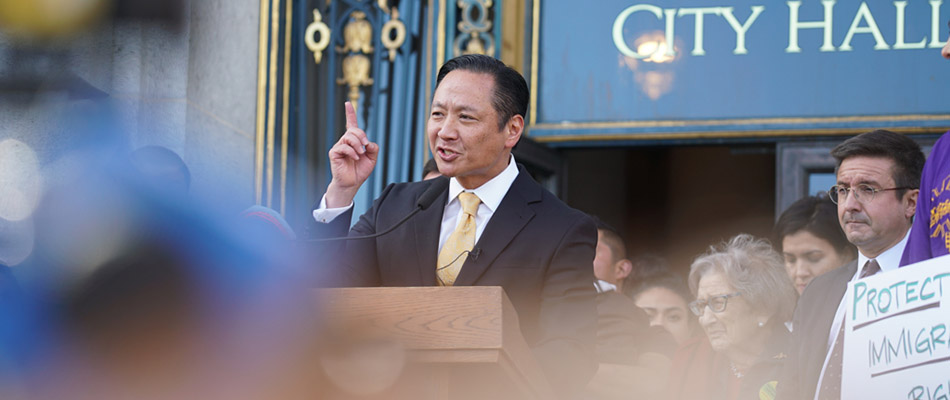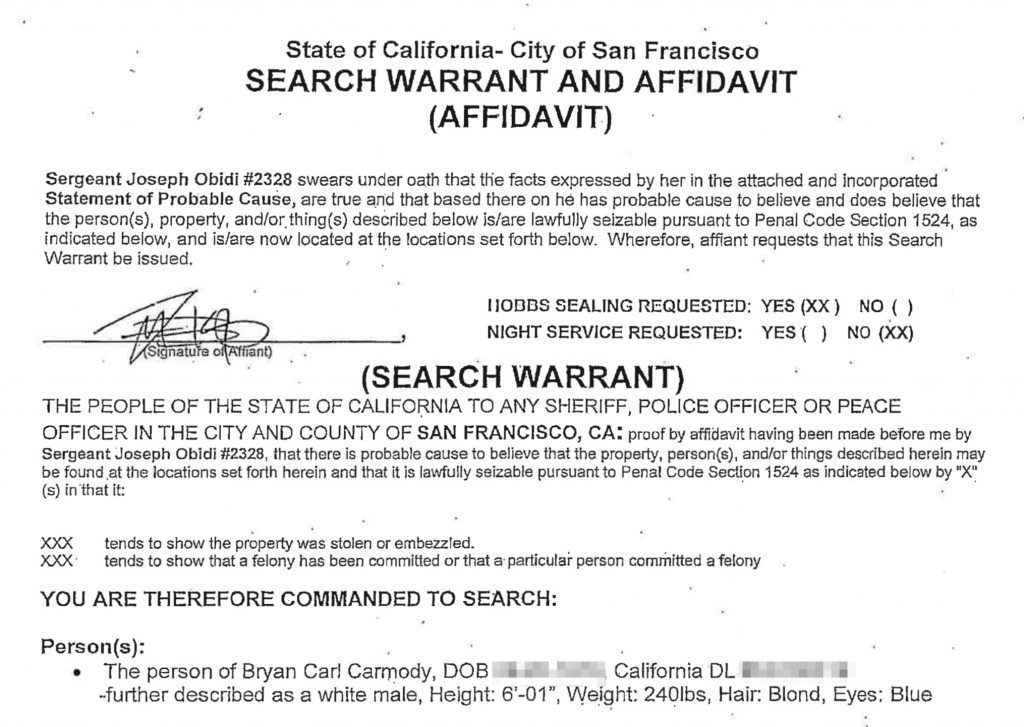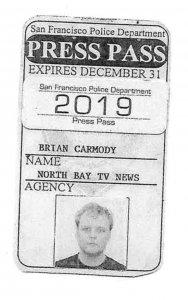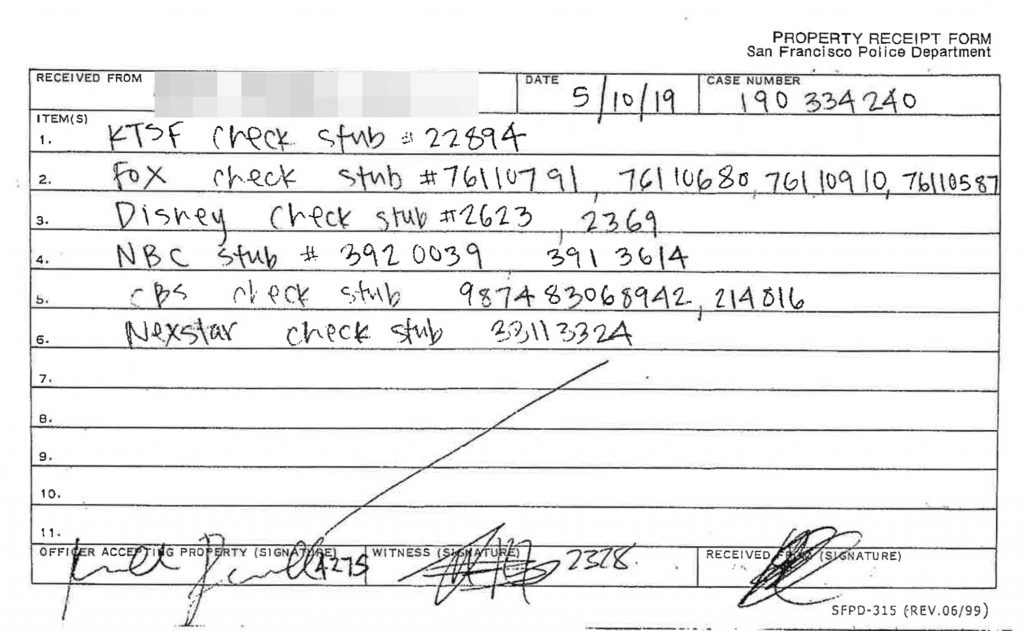
Jeff Adachi
Exclusive: Warrant Details Search of Journalist’s Home in Adachi Leak Probe
San Francisco Mayor London Breed said police followed ‘appropriate legal process’
By Matthew Keys, May 16, 2019 7:44 pm
Police seized more than five dozen items — including computers, camera equipment, electronics, pay stubs and other records and equipment — from a journalist’s home and office last week in connection with an investigation into how sensitive records related to the death of former San Francisco Public Defender Jeff Adachi made their way into the hands of reporters.
Last Friday, freelance journalist Bryan Carmody told the California Globe and other media outlets that his home and office were raided by San Francisco police officers and federal law enforcement agencies after he refused to disclose the name of a source who provided him with photographs, reports and other documents related to the death of the former public defender.
Adachi died in February from a lethal mixture of cocaine and ethanol, according to a medical examiner’s report. Shortly after his death was announced, reporters from various television stations published photographs showing the room where Adachi died along with anecdotal information about who Adachi was with and what he was doing in the hours before his death.
Police zeroed in on Carmody last month as part of an ongoing investigation into how those records were leaked to reporter. The journalist told the Globe on Friday that officers met with him in a friendly, informal setting to discuss the leak and asked Carmody if he would be willing to reveal his source.
Carmody refused. Police raided his home and office a short time later.

On Thursday, First Amendment lawyer Thomas Burke filed a motion to quash two search warrants used in the pair of raids, arguing the warrants were not legal because of a state shield law that protects reporters from disclosing anonymous sources.
Carmody operates North Bay Television News, a business that packages and resells news content to other media outlets.
In a declaration obtained by California Globe, Carmody said he obtained the records during his news gathering efforts after learning Adachi had died.

“At some point while I was investigating the news of Mr. Adachi’s death, I was provided a copy of a 16-page report dated February 22, 2019 concerning [the San Francisco Police Department’s] investigation of Mr. Adachi’s death,” Carmody wrote. He said he did not ask the source to provide him with a copy of the document and did not pay for the material given to him.
Carmody said he agreed to provide his source anonymity after the source asked not to be identified.
“Any and all information and documentary materials that I acquired relating to Mr. Adachi’s death were obtained in the course of my work as a journalist, for the purpose of gathering and disseminating news to the public,” Carmody wrote.
On April 11, two officers with the San Francisco Police Department visited Carmody at home, he said. Those officers, identified in court records as Lt. Tim Watts and Sgt. Joseph Obidi, reportedly suggested to Carmody that he could be the target of a federal grand jury subpoena if he did not reveal his source.
Carmody wrote in a court affidavit that he has not revealed his source to anyone.
The following month, Sgt. Obidi filed an application with San Francisco Superior Court for a search warrant. In an affidavit obtained by California Globe late Thursday evening, Sgt. Obidi wrote that there was probable cause to suspect Carmody was in possession of evidence that related to stolen property and a felony crime.
The affidavit, signed by San Francisco Superior Court Judge Gail Dekreon, gave police permission to search Carmody’s home, personal cell phone and Carmody himself. It also authorized police to search eight vehicles associated with Carmody’s home and business.
A supplemental warrant signed by Superior Court Judge Victor Hwang authorized police to search Carmody’s Fulton Street office.
An evidence inventory list obtained by California Globe revealed police seized dozens of cell phones, computers, photography equipment and other electronic devices. Notebooks associated with Carmody’s news gathering activities were also seized along with check stubs issued by the parent companies of KRON-TV (Channel 4), KPIX-TV (CBS, Channel 5), KGO-TV (ABC, Channel 7), KNTV (NBC, Channel 11) and KTSF Channel 26.

Last week, Carmody estimated the value of the equipment seized to be between $20,000 and $30,000; in court records, his lawyer argued the value of the equipment was on the higher end of that estimate.
On May 13, Carmody’s lawyer issued a letter to San Francisco police demanding the return of all equipment seized. Burke also demanded the agency not review any notes or other materials seized in the dual raids, according to a copy of the letter obtained by California Globe.
In his court affidavit, Carmody wrote a San Francisco police lieutenant contacted him a short time later acknowledging the journalist’s request for his property to be returned.
“We have been diligently working on identifying the items that are relevant to our criminal investigation,” the officer, identified in court records as Lt. Pilar E. Torres, wrote. “The property that is deemed as having no evidentiary value will be turned [over] to you as soon as possible.”
Carmody told California Globe last Friday the raid caused a significant burden on his livelihood, effectively shutting down his business for the time being. On Thursday, his lawyer argued Carmody was suffering “serious constitutional injury — and the public is being denied important information — with each passing day that the SFPD retains custody of his news gathering materials.”
In the days that followed the raid, the police department has issued numerous statements to members of the media defending the raid. On Wednesday, San Francisco Mayor London Breed issued her own statement saying police followed “the appropriate legal process to request a search warrant, which was approved by two judges.”
“I believe that someone within the (police) department needs to be held accountable for the release of this information,” Breed wrote.
- Assemblywoman Jacqui Irwin Proposes Law to Authorize Withholding Autopsy Reports From Public Disclosure - February 28, 2020
- As AG Becerra Seeks Federal Recognition of Consumer Privacy Law, Companies Ask for Relief - February 26, 2020
- New Legislation Would Carve Out Additional Exemptions for Information from California Open Records Laws - February 24, 2020


Excellent reporting, Matthew Keys. Here is a pretty good write-up on the California shield law. http://www.dmlp.org/legal-guide/california-protections-sources-and-source-material It is pretty shocking that these police and judges violated these laws — and for what purpose? Simply to stop gossip regarding the circumstances regarding the death. But, people want to know if Adachi met with foul play and the who/what/why/when of his death.
oh no, the PUBLIC might learn the NASTY TRUTH about how our LEFT LEANING LEGAL SYSTEM WORKS. if the rules laws and regulations get in the way, they just say F–K IT do whatever is necessary to HIDE the TRUTH. the public defender doing drugs getting HIGH probably had a HOOKER in his room too. maybe the HOOKER named some names of other COPS, JUDGES & LAWYERS, who work for the CITY of the HOMELESS, SHEET STREETS, NEDDLE STREETS AND DISEASE STREETS.